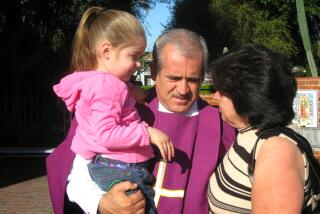PASSINGS
- Share via
Willard W. Scott Jr.
Superintendent of West Point
Willard W. Scott Jr., 82, an Army lieutenant general who led West Point through the aftermath of a cheating scandal and the introduction of coeducation, died of Parkinson’s disease Jan. 1 at his home in Alexandria, Va.
Scott was superintendent of the U.S. Military Academy from 1981 to 1986. He succeeded Gen. Andrew J. Goodpaster, who was called out of retirement to lead the school in the immediate wake of a 1976 cheating scandal that led to the expulsion of 150 cadets.
After the Vietnam War, applications to West Point had fallen off, and applicants often did not meet the academy’s traditional standards. Scott reduced required courses, expanded elective courses and allowed cadets, for the first time, to declare a major field of study.
As women began being accepted into the academy, he battled resistance from some students and alumni.
Scott was born Feb. 18, 1926, in what is now Fort Monroe, Va., and graduated from West Point in 1948 with a commission in field artillery.
He commanded troops throughout the world and led the 5th Corps in Germany from 1980 to 1981.
As West Point’s 52nd superintendent and for years afterward, Scott led cheers while riding an Army mule, the academy’s mascot, along the sidelines during football games.
John Kucingis
Refugee became Los Feliz pastor
Msgr. John Kucingis, 100, a Catholic priest who fled the Communist regime in his native Lithuania and served as pastor at St. Casimir’s Church in Los Feliz for nearly 40 years, died Jan. 6 at the church rectory.
Born Jonas Kucingis in Sveksna, Lithuania, on Dec. 23, 1908, he was ordained a priest in 1937. He was arrested four times by Soviet police in the 1940s before escaping first to Germany and then to the United States in 1946.
He came to Los Angeles, where St. Casimir’s parish had been founded by other Lithuanian refugees in 1941. After the church pastor died in 1947, Kucingis carried on, leading efforts to build the parish church, school, rectory and convent. He encouraged church members to sponsor Lithuanian refugees and speak out about Communist repression in their homeland.
“We were thrown out of our country,” Kucingis told The Times in 1969. “We were happy there. Like all people who are exiled, we brought a mission with us, to help those at home who are suffering, to be a loudspeaker for the whole world.”
Kucingis also established the church’s Lithuanian Language Saturday School, with classes taught in Lithuanian.
The church has about 3,000 members but attracts many Lithuanian Americans from across the Western United States. The parish remains a vibrant social and cultural center for the city’s Lithuanian community, in addition to being its religious focal point.
Kucingis retired as pastor in 1984 but continued to live at the parish rectory and lead church services.
-- times staff and wire reports
More to Read
Start your day right
Sign up for Essential California for the L.A. Times biggest news, features and recommendations in your inbox six days a week.
You may occasionally receive promotional content from the Los Angeles Times.









